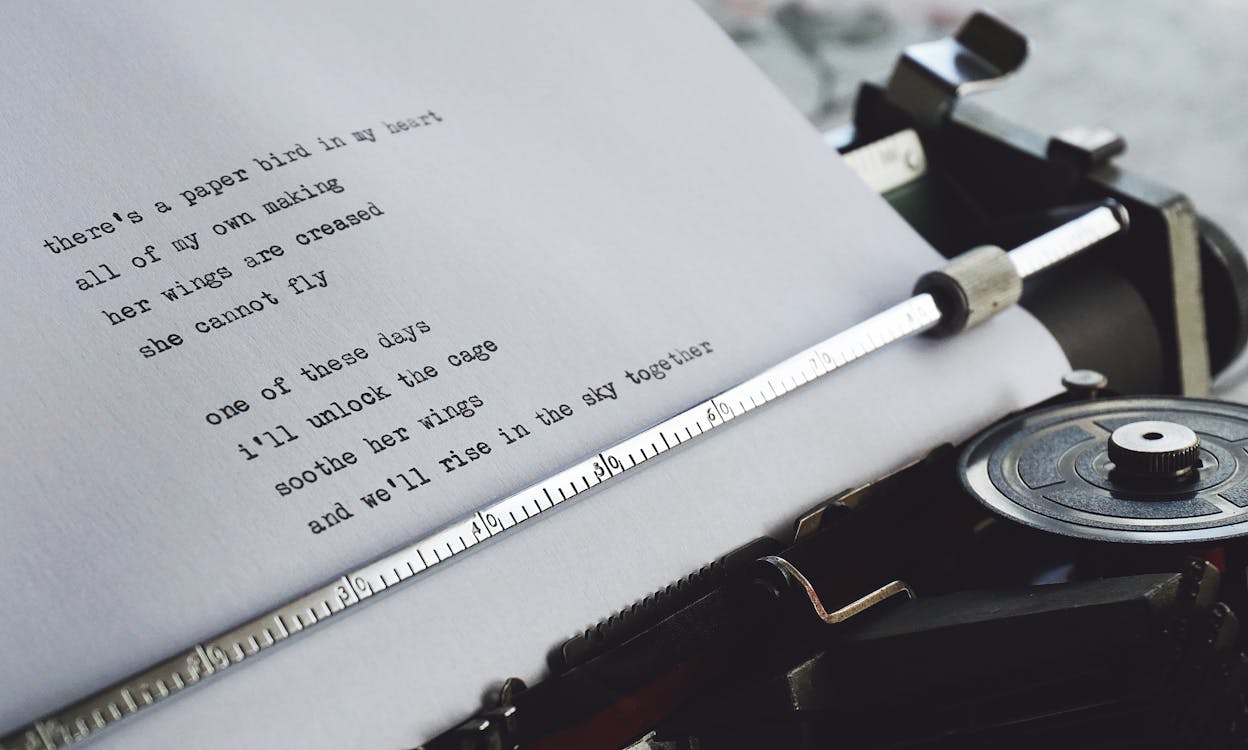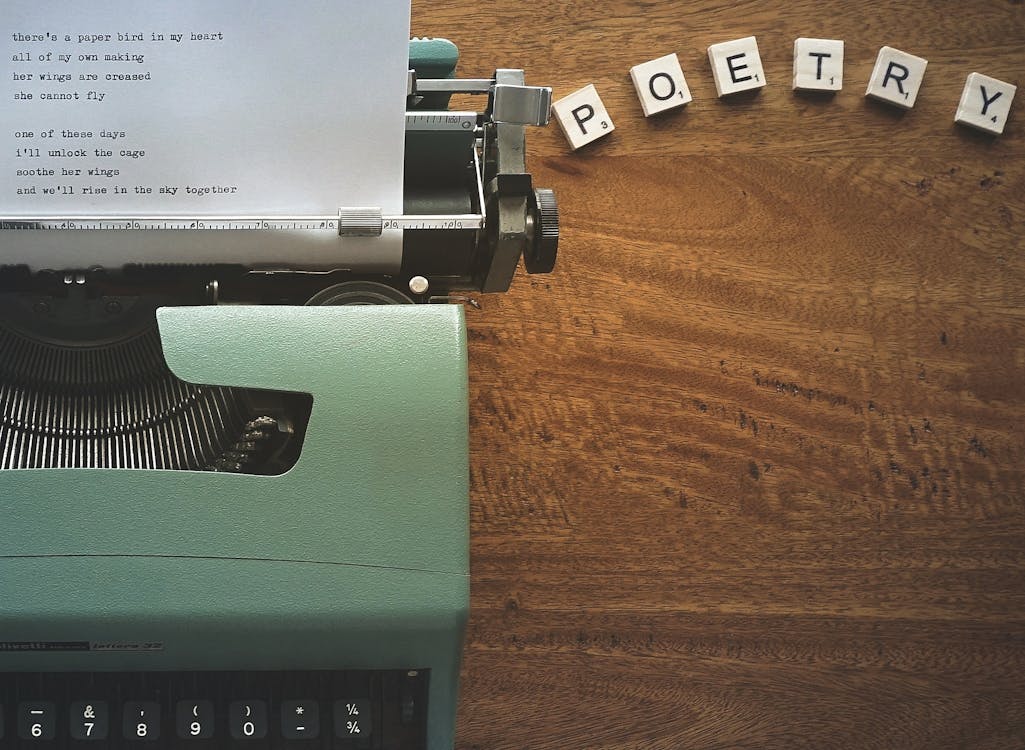Writing a poem for the first time can feel frightening, makes you wonder where to begin. If you follow the following simple steps, you’ll learn how to write a poem that expresses your thoughts, feelings or ideas. So, without further ado: let’s get started!
- What’s a poem?
Before you can write a poem, you need to know what makes a poem a poem in the first place. It’s defined as a collection or arrangement of words that expresses an emotion or idea in a more concentrated style than standard speech or prose. They’re typically written in verses (rather than paragraphs). They may include complete or incomplete sentences and often have a rhythm. But, they don’t have to rhyme.
2. Understand the purpose
Why are you writing this poem, what do you want to say? The purpose of your poem will determine what form or style you should use, how long or short it should be and the type of language you should use. Are you writing for yourself, for an assignment or for someone else?
3. Subjects
The subject is the focus of your poem, what your poem is about. So, choose a subject before you write. Common poetry subjects are: an emotion, a person, a place, a feeling, an object, an animal, a time etc.
4. Brainstorm
Start by writing down all the words that come to mind when you think of your subject. And imagine what other people or objects see or feel. Take a walk and experience every physical sense: touch, smell, sound, taste and vision. Watch people and animals, imagine their feelings and perspectives. All you have to do is start writing whatever comes to mind.

5. Poem format
The format of your poem is influenced by the subject and tone. There are many types of poems you can write. Poems don’t have to have rhymes and meter. Some of the easier types of poems are:
- Acrostic: the first letter of the first word on each line spells out a word
- Free verse: no rules, just write what comes to mind
- Haiku: a short poem that uses a specific number of syllables per line
- I Am: a poem that’s all about you, no rules attached
- Narrative: it tells a story and includes ballads and epics
- Rhyming couplets: the last word in each of two consecutive lines rhyme
6. Write a line
You have a purpose, subject, related words and a format. Now it’s time to write. Start off with one line. This could be a title, opening line or last line. Take a look at the line and see where you think it falls on the spectrum of your idea.
7. Write the rest
If you use the first line as your opening line, simply start adding lines after it. If it’s your ending line, you can work backwards or work towards that line. Don’t worry too much about perfect formatting, we’ll fix that later.
8. Editing
Put the first draft of your poem away for a day or two. Come back to it and see if you can make any improvements with a fresh pair of eyes. You could also let someone else read and critique it. And when you feel it’s done, it is.

9. Extra tips
- Write with feeling: what makes poems great is the feeling they give
- Avoid clichés: clichés are sayings that have been overused
- Use imagery: use concrete words that appeal to the senses
- Use similes and metaphors: similes compare two things and usually use the word ‘like’ or ‘as.’ Metaphors do the same, but without using those two words
Love, Deem/Skye Lewis ❤
You can also follow me on Facebook, Twitter, Instagram and Twitch
Image source: Pexels

Nice😊
LikeLiked by 1 person
🙂
LikeLiked by 1 person
Thank you for these tips!
LikeLiked by 1 person
You’re welcome!
LikeLike
I’ll try it but, I still suck at it haha
LikeLiked by 1 person
No you don’t!
LikeLike
I usually use a form similar to haiku, the tanka (that’s five lines with 5-7-5-7-7 syllables).
LikeLiked by 1 person
Oh yeah, that one works well too for a poem!
LikeLiked by 1 person
It works perfectly for me.
LikeLiked by 1 person
Glad it does!
LikeLiked by 1 person
I write poetry every day, it’s my escape
LikeLiked by 2 people
Same!
LikeLike
Very helpful guide, thanks!
LikeLiked by 1 person
You’re welcome!
LikeLike
Started writing and you’re right: it’s not that hard!
LikeLiked by 1 person
It really isn’t!
LikeLike
Much thanks for these tips 🙂
LikeLiked by 1 person
You’re welcome!
LikeLike
I call mine – Mind mapping in rhyme:
Writing down my thoughts in rhyme, I’ve found to be very therapeutic. It’s been enlightening finding out what I think. Like mind mapping, I never quite know where it’s going to take me.
LikeLiked by 1 person
That’s indeed such a beautiful way of writing poems, in my opinions. It often creates the best ones as the mind knows what needs to be written
LikeLiked by 1 person
Oh! thank you. It’s surprising how many answers one’s unconscious soul has to offer…when you follow each thread, inside your head, that leads you to them.
LikeLiked by 1 person
Precisely! As a writer, I can only agree with that! Your mind is the most wonderful source to find deeply hidden beauties that are ready to be shared with the world
LikeLiked by 1 person
I agree – I think that we use the words and choose the answers that best reflect our temperaments, when mind-mapping. Thank you for your encouragement.
LikeLiked by 1 person
Anytime! Encouragement is key to get those words out!
LikeLike
Oh dear! What I really wanted to know was – what label is it likely to come under? Sorry!
LikeLiked by 1 person
Label? I don’t quite get what you mean by that?
LikeLike
I made a mistake in asking you, because you wouldn’t know unless you saw what format/style I used. It’s the different types of poetry asked for that I need to learn more about. Thank you for your time. X
LikeLiked by 1 person
Oh! Yes that makes sense, but I do believe your poetry is a beauty on itself!
LikeLiked by 1 person
Thank you XXX
LikeLiked by 1 person
You’re welcome!
LikeLiked by 1 person